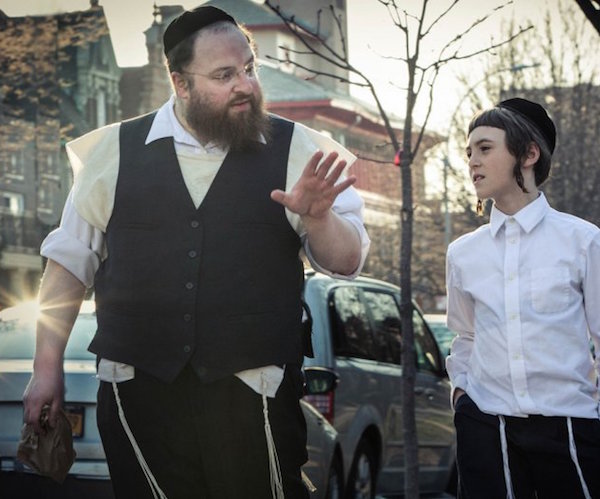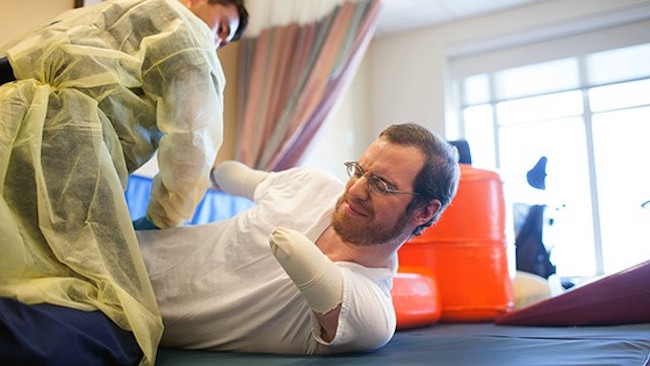Film Review: Round-up of the 15th IFFBoston — A Banner Year
The IFFBoston somehow gets even better with each incarnation.
By Gerald Peary
Hail, hail, the Independent Film Festival of Boston, which earlier this week completed its 15th running. I’ve attended every year from the beginning, and it somehow gets even better each incarnation. All praise to Nancy Campbell, festival programmer, for her intelligence, taste, and special eye for cinema.
Here’s a rundown report on what I saw in 2017, narrative and documentaries.
NARRATIVE FILMS:

A scene from “Menashe” — the performances are miraculous, whether through great directing or astute editing.
Menashe-Director Joshua Z. Weinstein’s strategy for his film was a conscious resuscitation of the tenets of 1940s Italian neorealism. The ultra-Orthodox Jewish roles are played by non-actor Hasidim, many of whom have never seen a movie in their sheltered lives. The performances are miraculous, whether through great directing or astute editing. They’re even more impressive because the language of the cast is Yiddish, not spoken by Weinstein. The modest but extremely affecting story harks back to The Bicycle Thief: a poor father and son in trouble, enveloped by the harsh, unforgiving modern city. The lead, Menashe Lustig, has been a Youtube presence, a wandering Hasid trying out comedy shtick. Here, he’s a tragedian who could have been a force in the legendary Yiddish theatre.
Youthmin– Director Arielle Cimino and lead actor and producer Jeffrey Ryan attended Massachusetts’s evangelical Gordon College. Their being one-time lambs in the fold make them the ideal persons to satirize the devout Christian life in this very cute send-up of Bible camp, told like an episode of The Office. Ryan shows Hollywood quality as the hyper, slightly demented, youth minister taking his geeky teen crew for a week in the wilderness. They get closer to Jesus through fierce competitive games among “turn the other cheek” true believers. The movie is mostly innocent, good-natured jest, but smutty moments break through for belly laughs. When’s the last time you saw a Christian flick with some mighty fine blowjob jokes?
Beach Rats– Filmmaker Eliza Hittman takes viewers where many never have been, pushing our noses deep into the transgressive world of Internet gay cruising, where sexual hookups are clandestinely arranged. The protagonist of the film (Harris Dickinson) is a closeted teenager who hangs out with his oft-shirtless neo-punk friends (an homage to the homoereotic cinema of Larry Clark?) and who has a truly gorgeous girlfriend (Madeline Weinstein, perhaps a future star). But when nobody is looking, he’s on-line, setting up gay trysts. Hittman’s indie film is well shot and accomplished but slightly off-putting in its unrelenting tabloid sensibility.
La Barracuda-The very talented husband-and-wife filmmaking team, Jason Cortlund and Julia Halperin, do an acidic take on genre with an old-school neo-noir set in the seedier music scene of Austin, Texas. A down-and-out British folksinger (Sophie Reid) lands at the home of relatives of a dead country singer and claims to be his illegitimate daughter. Has she arrived in Texas for honorable reasons, a needy woman seeking a new family? Or is she a homicidal intruder, a “femme fatale” bringing poison to her new relations, like Joseph Cotton’s Uncle Charlie in Alfred Hitchcock’s Shadow of a Doubt? Here’s a lethal dose of dark mystery in the mode of author Patricia Highsmith, whose misanthropic prose the directors credit as a seminal influence.
Columbus-Korean-American Kogonada (one name) makes his indie debut with a deliberately paced, contemplative and talky film in the European vein, or perhaps the quiet, pensive Japanese vein of Yosojiro Ozu. A fortyish Korean-American man (John Cho) arrives in Columbus, Indiana, to visit his dying architect father in a hospital, though they are alienated, never speak. He encounters a chirpy, articulate local adolescent (the luminous Haley Lu Richardson) with her own host of problems. They walk about inspecting Columbus’s famous modernist architecture and circle about in their minds whether a romance is possible. What’s unusual about Columbus for an American indie is also what’s sometimes annoying about it: how studied and mannered is Kogonada’s storytelling.
DOCUMENTARIES:

A scene from the documentary “Stumped” — a spirited, crowd-pleasing medical drama.
Stumped-Robin Berghaus’s spirited, crowd-pleasing medical drama was a no-brainer for IFFBoston’s Opening Night 1917. What decent human being could not be enormously moved by the rousing true-life story of college professor Will Lautzenheiser? Struck down by a horrific disease which necessitated the removal of his arms and legs to save his life, he struck back by becoming a “stand-up” comedian, making dotty black-humor jokes about his dire infirmities. In the meantime, the best and brightest of Boston’s medical world have been developing ways to attach, for the first time, actual human arms and hands in the operating room. Lautzenheiser gamely volunteers for the pioneering surgery. He becomes a poster boy for why all of us should sign up, renewing our driver’s licenses, to be organ donors.
Furusato-Were the demonstrations a few years back demanding the shutting of the creaky nuclear plant at Seabrook, NH, just 1960s tomfoolery? Think again, when you see Thorsten Trimpop’s scary, ghoulish non-fiction work, set in Japan where the Fukushima Daiichi nuclear power plant melted down because of an inconvenient tsunami. Several years later, a nearby town is split in two by municipal decree. It’s totally abandoned in one clearly irradiated half, a ghost city. Yet it’s still inhabited in the other half, where the citizenry deny any danger. Meanwhile, ponies are born with hideous deformities while the government—national and local—buries its head. Trimpop tells his incendiary story in a non-didactic way, wisely eschewing preachy voiceover, respecting the audience to make up its own mind if nuclear plants are A-OK, or putting us on the edge of extermination.
Burden-An interesting though slightly dispassionate look at West Coast artist, Chris Burden, whose early work brought vehement response. Burden was either embraced as an anarchist-minded visionary or despised as a self-promoting talentless creep. Was it revolutionary performance art or just masochistic lunacy when, in the 1970s, young Chris squeezed himself into a two-foot locker, spent several days lying comatose behind a piece of glass in a gallery, or, his most infamous moment, had himself shot in the arm? If you hate this guy already, you’ll loathe him more learning how, smug and cocky, he had his first wife agree to full-time employment for six years so he could be an undisturbed artist. Then he moved on to another young, attractive woman. And another. Three lovely wives, three divorces, a caricature of the hetero male modernist. This documentary journeys from historic footage to recent times, capturing a seemingly humbled Burden in his 60s, shortly before his death of cancer. This Burden, who long ago abandoned performance art, seems a pussycat. In the final phase of his life, he engineered ambitious, ingenious installations for the LA County Museum. Instead of the ephemera of his shock-tactics performances, he created potent monumental art to survive for the ages.
Edgar Allan Poe: Buried Alive-Eric Stange, a veteran of PBS documentaries, forges perhaps his most personal, satisfying work with this inventive bio covering the short strange life of the great 19th century American writer. Because Poe is so darned weird, and so, of course, are his wild-eyed short stories, Stange has taken license here to go beyond the staid, musty shooting of much public television. The result is a luscious Halloween night treat of imaginatively grotesque camera work (credit DP Boyd Estus) and a baroque blending of peculiar artist and his wacko poems and tales (credit editor Peter Rhodes). To do this right, you’ve got to have a perfect screwy Poe, and that’s actor Denis O’Hare.
Swim Team-In New Jersey, concerned parents of an autistic teenager start a competitive swim team for their son and other adolescent boys similarly afflicted. It’s thrilling to see our guys of the Jersey Hammerheads, bursting with new self-esteem, swimming their way to prizes. It’s truly a privilege when documentarian Lara Stolman takes us home with three of the boys. It’s both heartwarming and heartbreaking to see how they negotiate their unwieldy private lives with their anxious, caring parents. Each boy is amazing in a completely different way. I loved all three! Swim Team proves in spades the truth of the much-said adage, “If you meet one person on the spectrum…you meet one person on the spectrum.”

A scene from “One October” — a small masterpiece of cinema.
One October-Director Rachel Shuman took as direct inspiration the buoyant poetic anthropology of Frenchmen, Chris Marker (Le Joli mai) and Jean Rouch (Chronique d’un été), who, many decades ago in the early 1960s, filmed informal interviews with the passing populace in the Parisian streets. In 2008, on the cusp of Barack Obama’s ascendancy to the American Presidency, Shuman and cameraman David Sampliner strolled the sidewalks of New York and filmed interviews with everyday New Yorkers walking by, about their hopes and worries and dreams and hesitations. The interviewer here is everything: Clay Pigeon, a WFMU radio reporter with an uncanny ability to be compassionate and empathetic while also throwing out the most impolitic, daring questions: i.e., asking a transsexual if he “still has a penis.” The probing interviews are juxtaposed with Sampliner’s breathtaking vistas of Manhattan, and all the rich material is edited by director Shuman in the most stirring, extraordinary way. It’s very rare to see a documentary so perfectly made, a jewel of formal beauty. At 56 packed minutes, One October is a small masterpiece of cinema.
Gerald Peary is a retired film studies professor at Suffolk University, Boston, curator of the Boston University Cinematheque, and the general editor of the “Conversations with Filmmakers” series from the University Press of Mississippi. A critic for the late Boston Phoenix, he is the author of nine books on cinema, writer-director of the documentaries For the Love of Movies: the Story of American Film Criticism and Archie’s Betty, and a featured actor in the 2013 independent narrative Computer Chess.
Tagged: Beach Rats, Burden, Columbus, documentary, Edgar Allan Poe: Buried Alive, Furusato, Independent Film Festival Boston, La Barracuda, Menashe, narrative film, One October, Stumped, Swim Team
